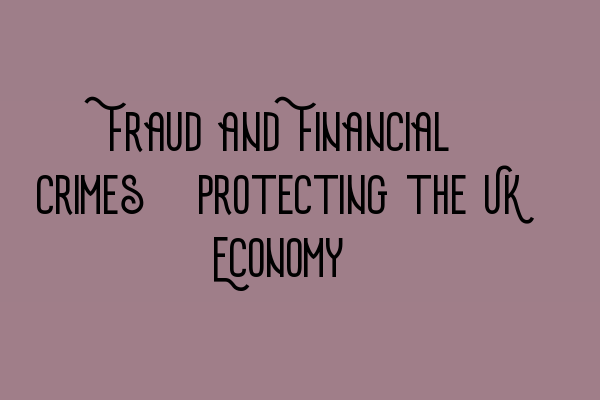Fraud and Financial Crimes: Protecting the UK Economy
Financial crimes pose a significant threat to the integrity of the UK economy. Fraud, in its various forms, has the potential to cause immense damage to individuals, businesses, and society as a whole. As a leading firm specializing in SQE Criminal Law & Practice in the UK, we recognize the importance of safeguarding our economy from such illicit activities. In this article, we will explore the different types of fraud and financial crimes, their impact on the economy, and the measures taken to address and prevent them.
Types of Fraud and Financial Crimes
Fraud is a broad term encompassing a range of illegal activities carried out with the intention of deceiving others for financial gain. Some common types of fraud include:
These crimes often involve complex methods and techniques used to trick innocent individuals, financial institutions, and even government bodies. Perpetrators often exploit vulnerabilities in existing systems and processes to carry out their fraudulent activities.
Impact on the UK Economy
Financial crimes can have a devastating impact on the UK economy. The direct financial losses incurred as a result of fraud stifle economic growth and can lead to the collapse of businesses. Additionally, these crimes undermine public trust in financial institutions and the integrity of the economy as a whole.
Furthermore, the resources required to investigate and prosecute cases of fraud impose a considerable burden on law enforcement agencies and the justice system. These resources could otherwise be allocated to other pressing matters, such as national security or public welfare.
Addressing and Preventing Financial Crimes
The UK government, along with regulatory bodies and law enforcement agencies, has implemented various measures to combat fraud and financial crimes. These include:
- Strict legislation and regulations to deter potential offenders and provide a legal framework for prosecuting financial criminals.
- Enhancing technological capabilities to detect and prevent fraudulent activities. This includes the use of advanced analytics and artificial intelligence to identify patterns and anomalies indicative of fraudulent behavior.
- Collaboration between government agencies, financial institutions, and the private sector to share information and enhance the overall response to financial crimes.
- Effective training and education programs to increase awareness of fraud and equip individuals with the knowledge and skills necessary to protect themselves.
While these measures are essential in combating fraud, it is also crucial for individuals and businesses to remain vigilant. Taking proactive steps to protect personal and financial information, such as regularly monitoring bank statements and using strong passwords, can significantly reduce the risk of falling victim to fraud.
Conclusion
Protecting the UK economy from fraud and financial crimes is a collective effort involving legislative action, technological advancements, and individual responsibility. As a leading SQE Criminal Law & Practice firm in the UK, we are committed to supporting the fight against financial crimes and ensuring the integrity of our economy. By working together, we can create a safer and more secure financial landscape, benefiting both individuals and businesses alike.
